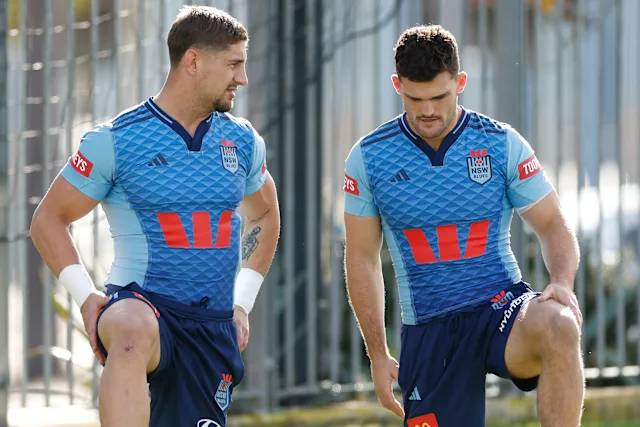The State of Origin series is always a hotbed of debate, and this year is no exception. With the decider just around the corner, all eyes are on the New South Wales Blues as they prepare to face Queensland in what promises to be a thrilling finale. But one topic has dominated discussions in recent days—Nathan Cleary’s role as the team’s primary goal-kicker. The debate has intensified following a candid admission from a key NSW star, sparking fresh controversy over whether Cleary should retain the kicking duties in Origin III.
Nathan Cleary has long been regarded as one of the best goal-kickers in the NRL. His accuracy off the tee is well-documented, and his ability to slot pressure kicks has won games for both Penrith and New South Wales. However, his recent performances in the Origin arena have raised questions. In Game II, Cleary missed two crucial kicks, which proved costly in a tight contest. While no one doubts his talent, the pressure of Origin football is unlike anything else, and even the best can falter under its weight.
The debate took a new turn when a senior NSW player—reportedly one of Cleary’s teammates—made a surprising admission in a private conversation that later surfaced in the media. The player, whose identity remains undisclosed, suggested that the Blues might benefit from exploring other goal-kicking options, at least for the decider. The reasoning? Origin is about momentum, and every point matters. With the series on the line, NSW cannot afford to leave points on the field, especially if Cleary’s confidence has taken a hit after his Game II performance.
This admission has divided fans and pundits alike. On one side, there are those who argue that Cleary’s track record speaks for itself. He has been the Blues’ go-to kicker for years, and his ability to bounce back from setbacks is well-known. Removing him from the role could undermine his confidence further, which would be counterproductive for a player who is also the team’s chief playmaker. After all, goal-kicking is as much about mental strength as it is about technique, and Cleary has proven he has both in spades.
On the other side, critics point to the cold, hard numbers. In high-stakes games, every missed kick can be the difference between victory and defeat. If there’s even a slight chance that another player—say, someone like Latrell Mitchell or Jarome Luai—could provide more reliability in the short term, shouldn’t NSW consider it? Mitchell, in particular, has a booming boot and has shown his ability to kick under pressure, while Luai has been a steady kicker for Penrith when called upon. The argument isn’t about questioning Cleary’s ability but rather about maximizing the team’s chances in a must-win game.
The conversation also touches on a broader issue: the burden placed on Cleary. As the Blues’ halfback, he is already responsible for steering the team around the park, organizing the attack, and making split-second decisions under immense pressure. Adding goal-kicking to that list is a heavy load, and some believe that sharing the duties could free him up to focus on his primary role as a playmaker. This isn’t without precedent—many great teams have split goal-kicking responsibilities to ease the strain on their key players.
Queensland, for instance, has often rotated kickers depending on form and game situation. The Maroons’ pragmatic approach has served them well, and NSW might be wise to take a leaf out of their book. Origin is about adaptability, and if the Blues are too rigid in their structures, they risk being outmaneuvered by a Queensland side known for its flexibility.
Of course, the final decision rests with coach Michael Maguire, who has remained tight-lipped on the matter. Maguire is known for his meticulous preparation and attention to detail, and he will no doubt be weighing all options carefully. Privately, he may already have a plan in place, whether that involves sticking with Cleary or making a late change. Publicly, however, he’s likely to keep his cards close to his chest to avoid giving Queensland any unnecessary advantages.
One thing is certain: the pressure on Cleary, whether he keeps the kicking duties or not, will be immense. Origin deciders are unforgiving, and every play is scrutinized. If he does retain the role, he’ll need to put the misses from Game II behind him and focus on the task at hand. If someone else takes over, it will be a defining moment in his career—how he responds could shape his legacy as a player.
Beyond the immediate implications for Game III, this debate raises bigger questions about how teams manage their star players. In modern rugby league, the workload on key positions is heavier than ever, and coaches must balance short-term gains with long-term development. Cleary is still young, and how he handles this situation could define his trajectory not just in Origin but in his career as a whole.
For now, all we can do is wait and see how the Blues handle the situation. One thing is clear: the goal-kicking debate is more than just about who takes the shots—it’s about confidence, strategy, and the fine margins that decide Origin games. Whatever decision is made, it will be a talking point long after the final whistle blows in Brisbane.
As fans, we can only hope that the right call is made, and that when the pressure is on, NSW has the best possible chance to reclaim the shield. Because in Origin, every point counts—and sometimes, the smallest decisions make the biggest difference.



